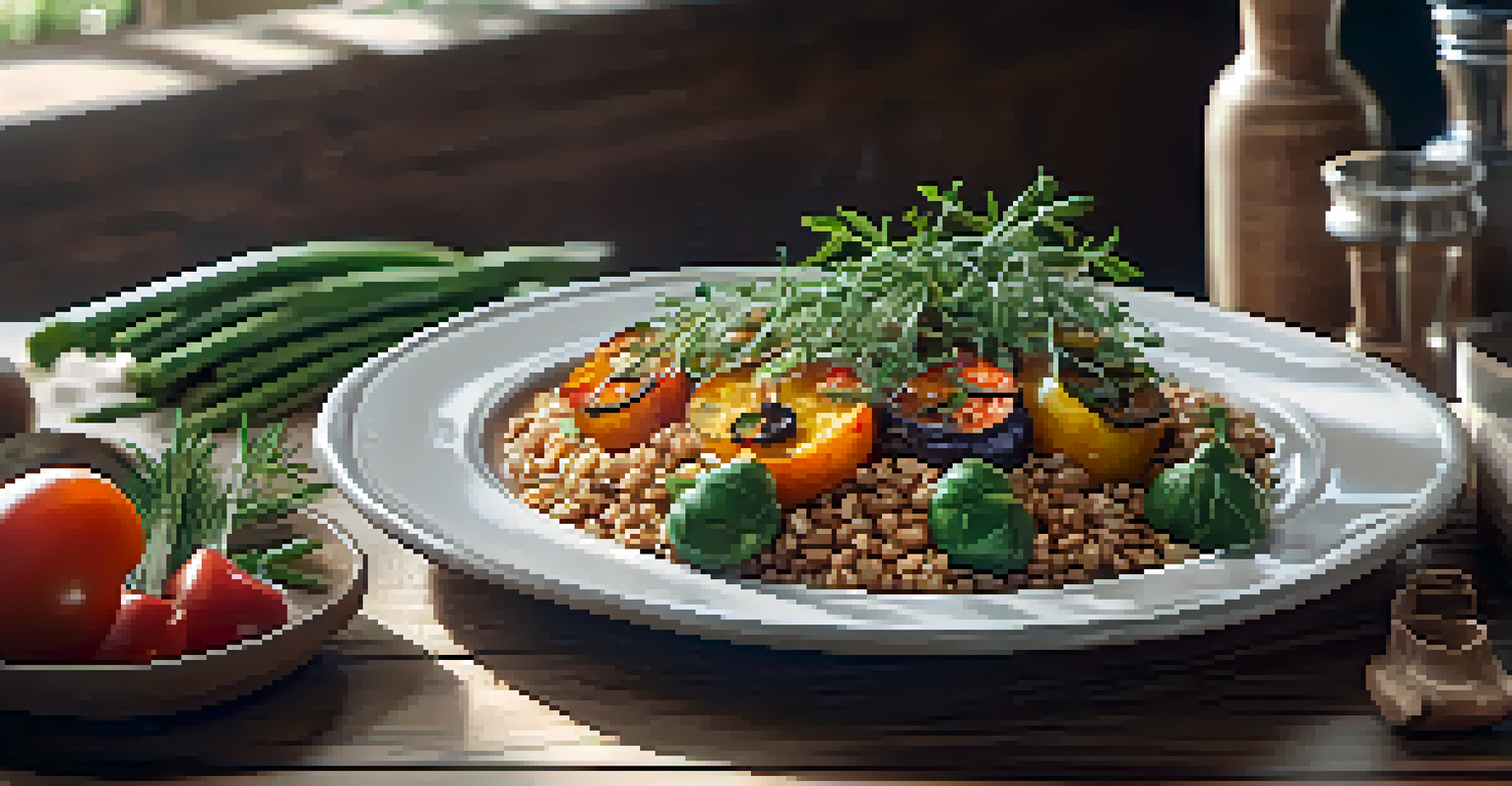Mindful Cooking: Enhancing Mental Health Through Food

Understanding Mindful Cooking and Its Benefits
Mindful cooking is all about being present in the moment while preparing food. It encourages us to focus on the textures, aromas, and colors of our ingredients, creating a deeper connection with what we eat. This practice not only enhances our culinary skills but also allows us to cultivate a sense of calm and clarity.
Cooking is like love. It should be entered into with abandon or not at all.
By engaging our senses, we can transform cooking from a mundane task into a joyful ritual. Imagine chopping vegetables while appreciating their vibrant colors or savoring the smell of herbs as they release their essential oils. This heightened awareness can lead to greater satisfaction and enjoyment in our meals.
Moreover, research shows that mindfulness can reduce stress and anxiety, making cooking a therapeutic exercise. When we cook mindfully, we shift our focus from worries and distractions, allowing our minds to relax. This creates a positive feedback loop, where the act of cooking nourishes both our bodies and our minds.
The Connection Between Food and Mental Health
Food plays a significant role in our mental health, influencing our mood and cognitive function. Nutrient-rich foods, like fruits, vegetables, and whole grains, provide the building blocks for neurotransmitters, which are essential for regulating our emotions. On the flip side, a diet high in processed foods can lead to feelings of lethargy and irritability.

When we practice mindful cooking, we become more aware of the nutritional value of our meals. This awareness encourages us to make healthier choices, leading to a more balanced diet. By prioritizing whole, nourishing foods, we can actively contribute to our mental wellbeing.
Mindful Cooking Enhances Wellbeing
Practicing mindful cooking fosters a deeper connection with food and can significantly reduce stress and anxiety.
Additionally, the act of preparing food can be a creative outlet, allowing us to express ourselves and boost our mood. Whether it's experimenting with new recipes or plating our dishes artistically, cooking mindfully gives us a chance to engage in a fulfilling and rewarding activity.
Creating a Mindful Cooking Space
Setting the stage for mindful cooking starts with creating a welcoming space in your kitchen. Clear away clutter and organize your cooking tools to foster a calm environment. When you cook in a tidy, inviting space, you’re more likely to feel relaxed and focused.
Mindful eating is about being fully aware of the experience of eating and drinking, both inside and outside the body.
Consider incorporating calming elements such as soft lighting, soothing music, or even aromatherapy with essential oils. These sensory details can enhance your cooking experience, making it easier to immerse yourself in the moment. It’s about crafting a sanctuary where you can truly enjoy the process.
Lastly, make it a habit to minimize distractions. Turn off the television and put your phone aside to fully engage in your cooking. This not only helps you concentrate but also allows you to enjoy the flavors and textures of your food without interruptions.
Engaging Your Senses in the Cooking Process
Mindful cooking is a sensory experience that invites us to engage fully with our food. Take time to appreciate the vibrant colors of fresh produce or the sound of sizzling ingredients in a pan. By tuning into these sensations, we can elevate our cooking experience and enjoy it more deeply.
As you chop, stir, or sauté, try to focus on the aroma wafting from the pan or the warmth of the stove. Engaging your senses helps you become more present and connected to the food you’re preparing. This mindfulness can enhance your appreciation for the meal you're about to enjoy.
Food Choices Impact Mental Health
Being aware of the nutritional value of our meals encourages healthier eating habits that contribute to better mental health.
Additionally, tasting as you cook is a wonderful way to connect with your food. Allow yourself to enjoy the flavors during the cooking process, adjusting seasonings as necessary. This not only ensures delicious results but also builds a deeper relationship with the food.
Mindful Cooking as a Social Activity
Cooking can also be a wonderful way to connect with others. When we cook mindfully in the company of friends or family, we create a shared experience that fosters bonding and communication. This social aspect of cooking can enhance our mental health by reducing feelings of isolation.
Consider hosting a cooking night where everyone contributes to a meal. As you chop, stir, and share stories, you’re not just creating a dish; you’re building memories. This communal effort can lead to laughter, joy, and a sense of belonging.
Moreover, sharing meals with loved ones often enhances the emotional satisfaction derived from food. Enjoying a meal together allows for deeper conversations and connections, reminding us of the importance of community in supporting our mental wellbeing.
Overcoming Challenges in Mindful Cooking
While mindful cooking has numerous benefits, it can come with its own set of challenges. Time constraints, stress, or even a lack of confidence in the kitchen can make it difficult to engage fully. However, recognizing these barriers is the first step toward overcoming them.
Start by simplifying your approach: choose easy recipes that don’t overwhelm you. Even a simple vegetable stir-fry can be cooked mindfully if you focus on the process. By setting realistic expectations, you can gradually build your skills and confidence in the kitchen.
Create a Calm Cooking Environment
A tidy and inviting kitchen space, free from distractions, enhances the mindful cooking experience and promotes focus.
Additionally, practice self-compassion. If you find your mind wandering during cooking, gently bring your focus back to the task at hand. Mindfulness is a practice, and it’s okay to have moments where you feel less present. With time, the process will become easier and more enjoyable.
Incorporating Mindful Cooking into Daily Life
Integrating mindful cooking into your daily routine doesn’t have to be daunting. Start small by dedicating one meal a week to the practice. As you become more comfortable, you can gradually increase the frequency. This small commitment can yield significant benefits for your mental health.
Try to establish a cooking ritual that works for you. Whether it’s preparing a Sunday dinner or a weekday lunch, having a designated time to cook mindfully allows you to prioritize this practice in your life. Consistency is key to reaping the rewards of mindful cooking.

Finally, remember that mindfulness is about the journey, not perfection. Embrace the process of cooking and enjoy the little moments along the way. With each mindful meal, you’ll not only nourish your body but also cultivate a sense of peace and wellbeing in your life.